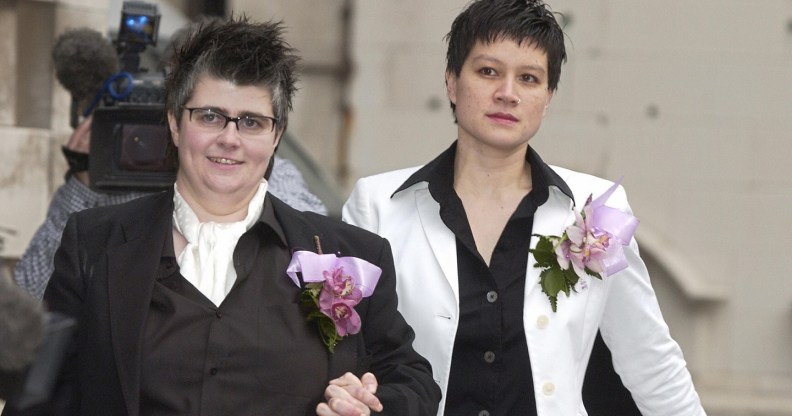Northern Irish government: It’s not discrimination to ban gay weddings because civil partnerships are allowed

Northern Ireland’s government has insisted it doesn’t violate human rights laws to get married – because civil partnerships are allowed.
Same-sex marriage is legal in England, Scotland, Wales and the Republic of Ireland – but Northern Ireland’s DUP has used peace powers to veto the issue despite a parliamentary majority in favour.
A marriage bill was passed last month by a vote of 53-52, only for the Democratic Unionist Party to override the assembly using a ‘petition of concern’.
Belfast’s High Court is currently hearing one of a number of cases revolving around same-sex marriage.
In a case heard this week, two couples in civil partnerships, who are unable to get marred in Northern Ireland, claim that the rules are breaching their entitlement to family life and marriage under Article 8 of the European Convention on Human Rights.
However, the Northern Irish government claims that because it allows civil partnerships, it has not breached their rights.
According to the Belfast News Letter, Tony McGleenan QC of the Department of Finance and Personnel insisted: “All of the applicants are civil partners, they enjoy all the rights and benefits that go with that.
“What they are looking is the ability to call their relationships a marriage.
“No doubt that causes consternation and concern, confusion is how the applicants put it in their affidavit, but is it an interference with their Article 8 rights? We say it’s not.”
However, challenged about the blockade on the issue in Stormont, he conceded: “It cannot be denied that it’s a live issue.”
There a number of differences between civil partnerships and marriages.
Activists say that civil partnerships have less international recognition than marriages, potentially leaving couples without recognition abroad.
Opposite-sex couples can also opt for a religious or civil marriage ceremony as they choose, whereas a civil partnership is an exclusively civil procedure.

